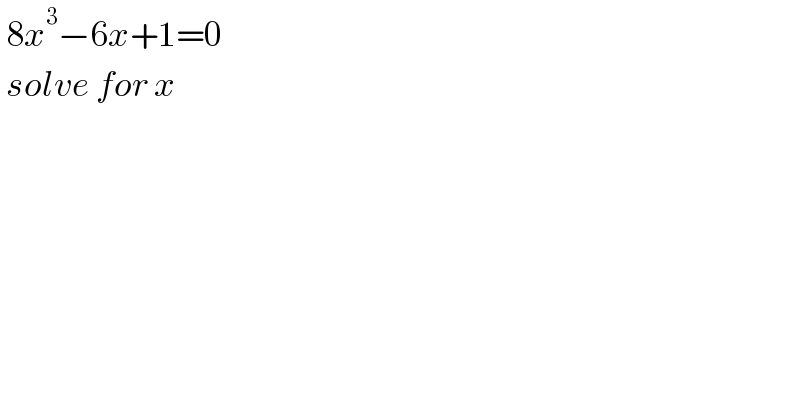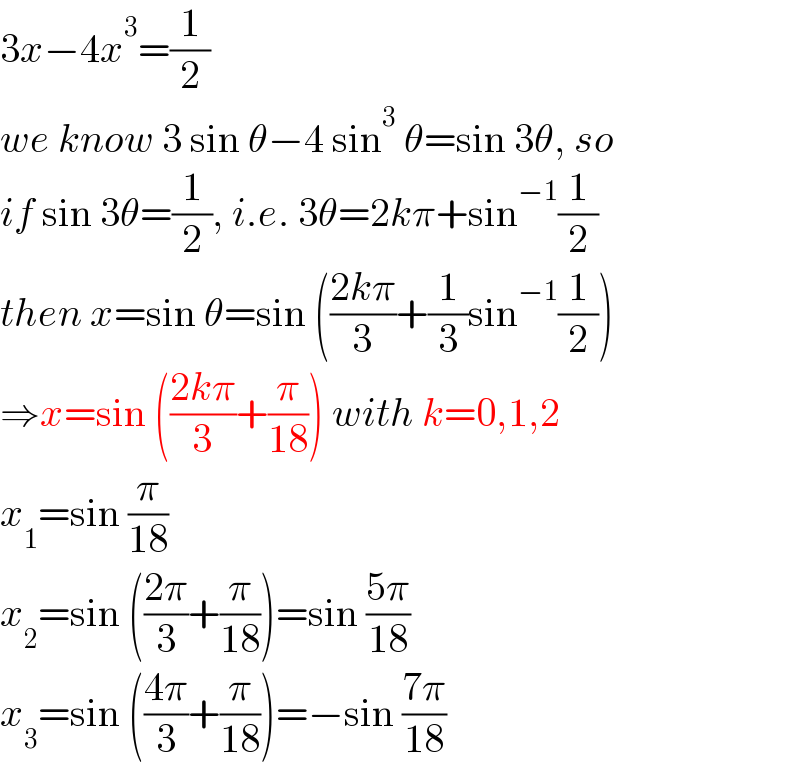
Question Number 166378 by MathsFan last updated on 19/Feb/22

$$\:\mathrm{8}{x}^{\mathrm{3}} −\mathrm{6}{x}+\mathrm{1}=\mathrm{0} \\ $$$$\:{solve}\:{for}\:{x} \\ $$
Answered by mr W last updated on 19/Feb/22

$$\mathrm{3}{x}−\mathrm{4}{x}^{\mathrm{3}} =\frac{\mathrm{1}}{\mathrm{2}} \\ $$$${we}\:{know}\:\mathrm{3}\:\mathrm{sin}\:\theta−\mathrm{4}\:\mathrm{sin}^{\mathrm{3}} \:\theta=\mathrm{sin}\:\mathrm{3}\theta,\:{so} \\ $$$${if}\:\mathrm{sin}\:\mathrm{3}\theta=\frac{\mathrm{1}}{\mathrm{2}},\:{i}.{e}.\:\mathrm{3}\theta=\mathrm{2}{k}\pi+\mathrm{sin}^{−\mathrm{1}} \frac{\mathrm{1}}{\mathrm{2}} \\ $$$${then}\:{x}=\mathrm{sin}\:\theta=\mathrm{sin}\:\left(\frac{\mathrm{2}{k}\pi}{\mathrm{3}}+\frac{\mathrm{1}}{\mathrm{3}}\mathrm{sin}^{−\mathrm{1}} \frac{\mathrm{1}}{\mathrm{2}}\right) \\ $$$$\Rightarrow{x}=\mathrm{sin}\:\left(\frac{\mathrm{2}{k}\pi}{\mathrm{3}}+\frac{\pi}{\mathrm{18}}\right)\:{with}\:{k}=\mathrm{0},\mathrm{1},\mathrm{2} \\ $$$${x}_{\mathrm{1}} =\mathrm{sin}\:\frac{\pi}{\mathrm{18}} \\ $$$${x}_{\mathrm{2}} =\mathrm{sin}\:\left(\frac{\mathrm{2}\pi}{\mathrm{3}}+\frac{\pi}{\mathrm{18}}\right)=\mathrm{sin}\:\frac{\mathrm{5}\pi}{\mathrm{18}} \\ $$$${x}_{\mathrm{3}} =\mathrm{sin}\:\left(\frac{\mathrm{4}\pi}{\mathrm{3}}+\frac{\pi}{\mathrm{18}}\right)=−\mathrm{sin}\:\frac{\mathrm{7}\pi}{\mathrm{18}} \\ $$
Commented by MathsFan last updated on 19/Feb/22

$${thank}\:{you}\:{sir} \\ $$$${but}\:{can}\:{canado}'{s}\:{formula}\:{be}\:{applied} \\ $$$${to}\:{this}\:{question}? \\ $$
Commented by mr W last updated on 19/Feb/22

$${no}. \\ $$
